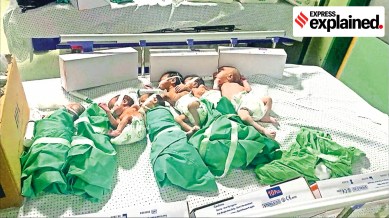Why Israel is attacking Gaza’s al-Shifa hospital
“The situation is dire and perilous. It’s been 3 days without electricity, without water and with very poor Internet which has severely impacted our ability to provide essential care,” the WHO’s director-general Tedros Adhanom Ghebreyesus said on X.

The Gaza Strip’s largest and most advanced hospital, al-Shifa, is no longer functioning due to loss of power and water supply, the World Health Organization (WHO) said on Monday. About 40 patients have died in recent days, and hundreds remain trapped inside premises with Israeli troops battling Hamas fighters nearby.
“The situation is dire and perilous. It’s been 3 days without electricity, without water and with very poor Internet which has severely impacted our ability to provide essential care,” the WHO’s director-general Tedros Adhanom Ghebreyesus said on X.
Why is al-Shifa hospital important?
Al-Shifa used to be the cornerstone of Gaza’s healthcare system before the Israel-Hamas war broke out. Located in Gaza City, in the north of the tiny Palestinian enclave, the hospital comprises a group of six-storey buildings. It had between 600 and 900 beds and thousands of staff, and provided a range of services that almost no other hospital in Gaza offered. Since the start of the war, al-Shifa has also been serving as a shelter for those displaced by the fighting and incessant Israeli bombing.
Why is al-Shifa in the crosshairs?
The hospital has been encircled by Israel’s forces, who began their ground invasion of the enclave at the end of October. They have alleged that al-Shifa sits atop an underground headquarters of Hamas militants, who have been using the building, patients, and staff as human shields.
Hamas and officials of Gaza’s health ministry, however, have denied the claims, saying Israel is making baseless accusations to justify attacks on health facilities.
Dr Ghassan Abu-Sittah, a British doctor working at al-Shifa described the Israeli claim as an “outlandish excuse”, a report by The Guardian said. Human Rights Watch, the US campaign group, said it could not verify the Israeli allegations.
US President Joe Biden on Monday said Gaza’s hospitals “must be protected”. He added, “My hope and expectation is that there will be less intrusive action relative to hospitals and we remain in contact with the Israelis”.
What is the situation like at the hospital?
About 650 patients and 5,000-7,000 displaced civilians are trapped inside al-Shifa, and they are under constant fire from snipers and drones, according to Hamas. The militant group added that 40 patients have died, including three premature babies whose incubators were shut down when electricity went out.
Currently, there are 36 premature babies at the hospital who need incubators to survive. Israel on Tuesday said it was offering portable, battery-powered incubators so the babies could be evacuated. But Ashraf al-Qidra, Gaza’s health ministry spokesman, said so far no arrangements had been made to move out the babies. Medics had to wrap babies in cellophane to keep them alive, Mohamed Abu Silmeyeh, director of al-Shifa hospital, said on Saturday.
Al-Qidra also added that there were about 100 bodies decomposing inside and the hospital staff had failed to get them out.
“We are planning to bury them today in a mass grave inside the al-Shifa medical complex. It is going to be very dangerous as we don’t have any cover or protection from the ICRC (International Committee of the Red Cross), but we have no other options as the corpses of the martyrs have begun to decompose,” he told Reuters.
Although Israel has denied that al-Shifa is under siege and said its forces allow routes for those inside to exit, medics and officials inside the hospital claim those trying to leave have come under fire.
What does international humanitarian law say?
Under international humanitarian law, hospitals get special protections during war. However, they lose their protections in case combatants use the premises to hide fighters or store weapons, according to the ICRC. In such a situation, there has to be a number of warnings before attacks to allow for the safe evacuation of patients and medical workers, ICRC legal officer Cordula Droege told The Associated Press.
Jessica Wolfendale, an expert in military ethics at Case Western Reserve University in Ohio, said if Israel successfully proves that al-Shifa is used as a command centre by Hamas, even then the principles of international law will remain in place.
“It doesn’t license an instant attack,” she said. “Steps need to be taken to protect the innocent as much as possible.”